Hello from Malaysia, a new chance for Tu-214 and how industrial parks were ‘sold’ for export
What Tatarstan representatives discussed at the Eastern Economic Forum 2024
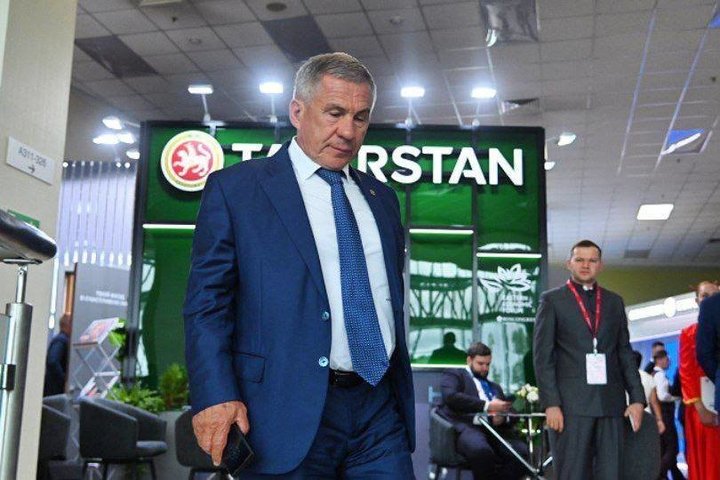
“Uzbekistan approached our project with interest [we are talking about Chirchik technology park in the Tashkent region], provided tax breaks [to residents]. But Tajikistan, for example, asks questions. And other countries too,” said State Duma deputy Alfiya Kogogina at a panel session of the Eastern Economic Forum about the need to invest in the “export” of industrial parks to the CIS countries. At that time, Rustam Minnikhanov negotiated with Malaysian Prime Minister Anwar Ibrahim on expanding trade, and State Transport Leasing Company signed an offer for the supply of more than 40 Tu-214 aircraft manufactured in Kazan, which can be regarded as a new chance to take off. More details in a report of Realnoe Vremya.
Russian bears and Asian dragons
The general exposition of the 2024 Eastern Economic Forum (EEF) was adjusted to the Asian tone. Somewhere at the beginning of the exhibition corridor, an Aeroflot stand was decorated with an illustration of brown bears, at the other end, one could see a glowing installation of deer against the dark blue background of the polar lights, and a Skolkovo resident hung a poster with an Amur tiger above himself. In this “taiga spirit” of the concept, one could catch an echo of Asian tigers and Chinese dragons, which symbolise the rise of Asia in the global economy.
Delegations from China, India, and Malaysia came to the EEF-2024. Other countries of Southeast Asia, which are becoming important partners of Russia in building new trade chains, are not far behind. According to the “taiga” spirit of the concept, then Tatarstan could, for example, bring an installation of a white leopard and organically fit into the theme.
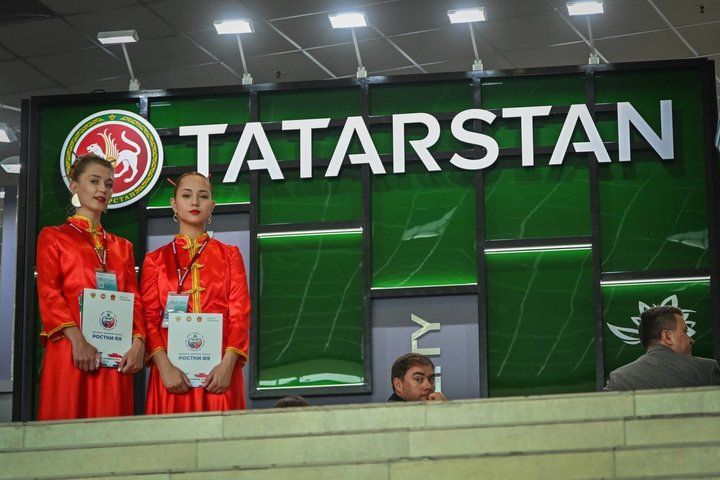
However, the republic preferred a strict business form: the stand was made in a combination of green and grey colours. It was surrounded by spectacular girls in satin red kimono dresses, with their hair styled with Chinese hairpins. They invited guests to the upcoming “Chinese” forum ROSTKI: Russia and China — Mutually Beneficial Cooperation, which will be held in November, immediately after the BRICS Summit.
“Will Rustam Minnikhanov be there in person?”
“At the EEF, we are presenting a stand to showcase the innovative, investment, industrial, trade and economic potential of Tatarstan,” the Telegram channel of the Investment Development Agency reports the words of its head Taliya Minullina. “The government of the republic will hold a number of meetings on the development of logistics networks. There are several projects in this area in Tatarstan, one of the largest is the construction of the logistics complex named after Deng Xiaoping. In addition, the EEF participants are mostly actively working with the East and will be interested in attending our ROSTKI forum in November this year.”
Even before Rustam Minnikhanov's arrival, head of Dom.RF Vitaly Mutko visited the stand. “Will the boss be there? Will Rustam Minnikhanov be there in person?” he asked those who happened to be near the stand at that moment. Having heard an affirmative answer, he moved on.
By lunchtime, Rustam Minnikhanov met with Malaysian Prime Minister Anwar Ibrahim on the sidelines of the forum. Judging by how warm their handshake was, the meeting was long awaited.
“Our last meeting was held in a very friendly atmosphere. You inspired us to come here with a large delegation,” the Malaysian guest noted.
In response, the governor of the republic noted that trade, economic and investment cooperation is a priority for Tatarstan. And he reminded him: the volume of trade turnover remains small — only $ 61 million, although it has grown 5.5 times over the year.
“Tatarstan, as an export-oriented republic with powerful industrial potential, is ready to supply the widest range of products,” said Rustam Minnikhanov.
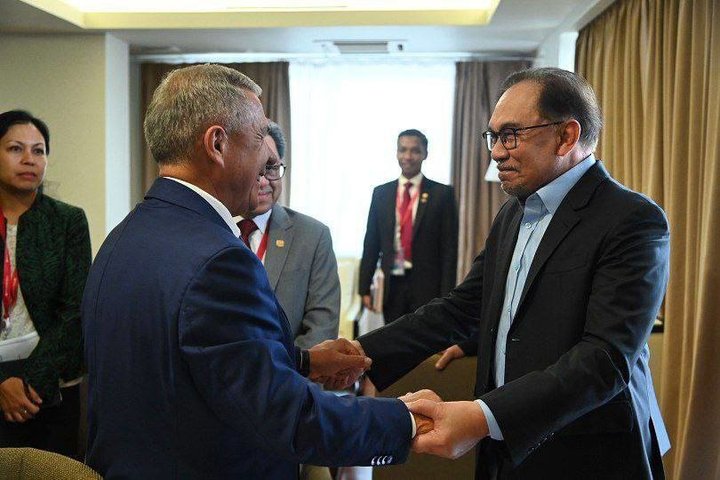
“So far this is a rare commodity”, or How to build parks in the CIS countries
Meanwhile, a discussion about the promotion of Russian entrepreneurship to the East unfolded at the panel session of the EEF-2024. First Deputy Chairman of the State Duma Committee on Small and Medium Entrepreneurship Alfiya Kogogina urged investing in the “export” of industrial parks to the CIS countries. In her opinion, the Ministry of Industry and Trade’s programmes should include expenses for the construction of industrial park infrastructure in the CIS countries. And as an example, she cited the experience of the Chirchik technology park in Uzbekistan, which was created with the personal participation of Rustam Minnikhanov and President of Uzbekistan Shavkat Mirziyoyev. The Prime Minister of Uzbekistan headed the administrative council of the technology park.
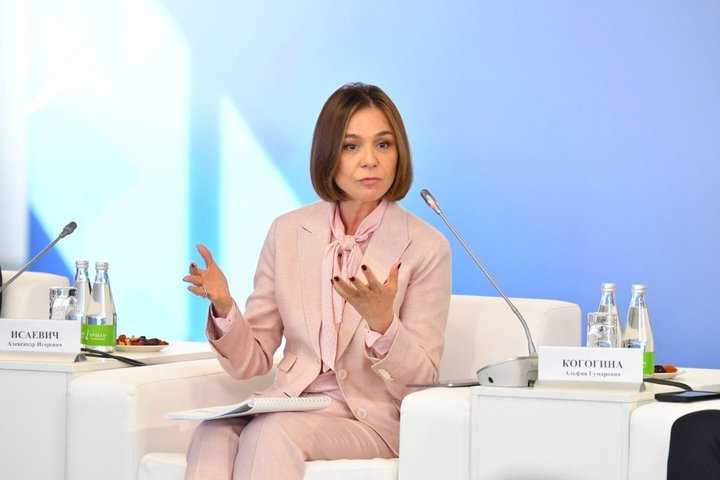
“Chirchik is the most developed of all Russian industrial parks abroad. At the start of the project, the Uzbek authorities invested $22 million, and the Russian side is responsible for project management, attracting residents, marketing, developing a style and full administration of the project. The first residents were Russian companies that had plans to enter this market and thus facilitated their promotion. Today, there are 29 residents, including residents from Korea and Germany. Now its area is 52,000 square meters and by the end of the year it will grow to 73,000 square meters,” she said.
According to her, in a year and a half, for every ruble invested in Uzbekistan, one ruble of added value was received in Russia.
According to Kogogina, two technology parks operate in Uzbekistan where the republic is involved: Chirchik and Jizzakh, another is being built in Navoi. The plans include building one industrial park in Azerbaijan and Tajikistan. All parks are brownfields created on empty, non-operating sites. But the authorities of other CIS countries are in no hurry to invest in infrastructure.
“Uzbekistan has approached the project with interest and, in addition to investments, has provided tax incentives at the level of free economic zones, preferential loans 5% lower than regular commercial loans, customs benefits with a 120-day payment deferral, compensation for transportation costs and a deferral of rental payments until production is launched,” said Kogogina. “But for now, this is a rare commodity. Uzbekistan has 100% of the capital costs, but this is not possible in all countries. Tajikistan is asking questions, like other countries.”
According to her, it is necessary to determine sources of financing, priority countries, priority industries that will go to the parks. She proposed establishing criteria for parks, management companies, residents, and packaging them into a project that would allow the task of increasing the export component of small and medium businesses to be accomplished. According to the session participants, cooperation with China can be developed in industrial parks.
Head of the Weilai Scientific, Technical, Trade and Economic Cooperation Center Xie Weidong agreed that this idea has prospects. According to him, China is overflowing with technology parks, and production is higher than domestic demand.
“The Chinese are looking for new markets because there is strong competition within the country. Yesterday I spoke with elevator manufacturers. They complain that due to high competition within the country, the profits of elevator manufacturers have fallen, so they want to enter the CIS countries. A thousand yuan is very little,” he lamented.
Commercial Director of the Far Eastern Shipping Company Denis Kanatayev assured the audience that logistics operators will be able to ensure the delivery of goods.
“FESCO has traffic from the port of Vladivostok to the countries of Southeast Asia, 11 ships have been launched. Last year, they launched a service to St Petersburg, six sea vessels are operating on the route. A regional hub for receiving container cargo from other countries — Malaysia, Myanmar, Singapore — has been organized at the port in Ho Chi Minh City,” Kanatayev listed the possibilities.
GTLK is ready to purchase 41 Tu-214 aircraft with delivery by 2032
In the afternoon, new opportunities for Tatarstan aircraft manufacturers became known. GTLK (State Transport Leasing Company) is ready to purchase 41 long-range Tu-214 aircraft, which are assembled at the Kazan Aviation Plant named after S.P. Gorbunov (a branch of Tupolev).
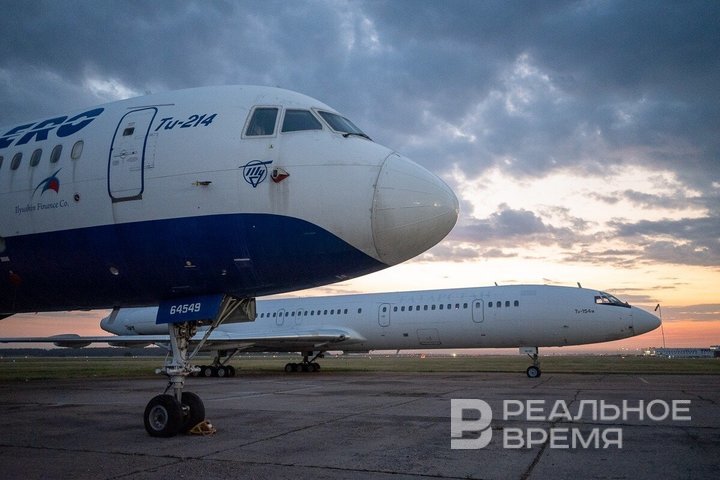
A batch of airliners in such quantity was included in the package agreement between GTLK and the United Aviation Corporation (UAC) signed earlier in the morning as part of the Eastern Economic Forum 2024, Realnoe Vremya was told in the press service of GTLK. In total, GTLK and the United Aviation Corporation agreed to purchase 238 Russian-made aircraft. Among them are 132 SJ-100 aircraft, 65 Il-114-300 aircraft and 41 Tu-214 aircraft, the GTLK statement noted. The agreement of intent was signed by GTLK CEO Evgeny Dietrich and UAC CEO Yuri Slyusar.